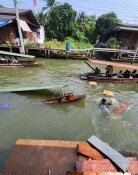[Opinion] Ship of Miracles
One of the first maxims a man learns when he goes to sea is to always give another man a hand with a job that he cannot do so himself. The entire safety of the vessel and all that she carries depend on this principle. You might say that this is a corollary of Thou shalt love thy neighbor as thyself. This is how Captain Brother Marinus LaRue started his address at the National Press Club, Washington, in August 1960. He was delivering an acceptance speech for a U.S. government award for his operation at Hungnam Dock on a cold, windy day in December 1950.
The steamship Meredith Victory (7,607 tons), under charter to the Navy for military sea transportation services, had undertaken an emergency evacuation of 14,000 Korean civilian refugees and was transporting them to Geoje-do, Busan. The ship had accommodations for only 12 passengers excluding the 35 crewmembers. However, the evacuation trip that lasted three days without any loss of lives was, literally, a miracle. Later, the Dwight D. Eisenhower administration highly praised this rescue as the greatest marine rescue operation in human history, which is not an exaggeration. In Ship of Miracles by Bill Gilbert, the urgent moments of that time are vividly described.
After the Korean War, heroic stories of the steamship Meredith Victory drifted into the past and people forgot about it. The crew of the Meredith Victory received two awards from the U.S. and Korea, respectively, in 1958 and 1960, but that was all. Captain LaRue, who ordered his crew to take refugees aboard, entered the Benedictine Order in 1954. He lived as Brother Marinus until he died in 2001. In all likelihood, most refugees who had sought freedom on that ship might have died now as well.
It is welcomed news that the steamship Meredith Victory has been registered as the greatest rescue operation by a single ship by the Guinness Book of World Records this year, and not because it is a commemoration of an impressive moment of the forgotten Korean War. Thinking of the turmoil in values that Korean society is now facing, remembering the ship of miracles could serve to help us look back at the hardships that generation has gone through, and to recall the meaning of a blood alliance between two nations. Furthermore, it will help both countries build a better future together. Now, at St. Paul`s Abbey in Newton, New Jersey where Brother Marinus had been serving, plans for building a monument and park for him are in process, which is more good news.
Song Mun-hong, Editorial writer, songmh@donga.com







